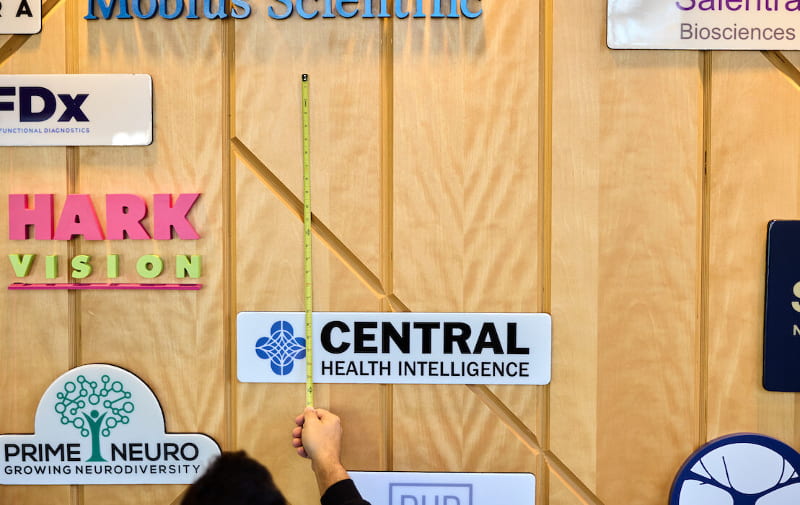The first-floor walls at 4240 Duncan Ave. — home to Washington University in St. Louis’ Office of Technology Management (OTM) — are running out of room. And that’s a good thing.
The logos of Washington University startup companies launched to shepherd promising university-owned diagnostics, therapeutics or other technologies to the marketplace are prominently displayed on the walls. A decade ago, the expansive walls had plenty of white space. But recently, OTM celebrated a milestone: Washington University’s 100th startup and counting. The walls are filling up.
Over the past three decades — but most notably in the past 10 years — OTM has worked proactively to help the university’s faculty researchers commercialize innovative technologies developed in their labs. By supporting faculty in spinning off their research into startup companies or licensing promising technologies to established pharmaceutical or medical device companies for further development, OTM aims to help Washington University innovations make it to the marketplace, for the benefit of society.
“Innovative ideas that are sparked in our academic labs hold immense potential for addressing the most pressing challenges in medicine,” said Nichole R. Mercier, PhD, assistant vice chancellor and OTM’s managing director. “One of our major initiatives at Washington University is commercializing our discoveries and getting them to the bedside to help patients. These first 100 WashU startup companies represent diverse industries and reflect the university’s commitment to fostering innovation and entrepreneurship. The companies and the technologies they’re developing are a great source of inspiration.”
The 100-plus startup companies that OTM helped take root are working to prevent, treat and diagnose cancers, neurodegenerative diseases, infectious diseases and other illnesses. These companies are further developing faculty technologies into patient products, such as blood tests for detecting Alzheimer’s disease before symptoms develop, a brain-computer interface that helps restore motor function in patients suffering from devastating strokes, and a nanoscale material that helps wounds heal, among numerous other technologies.
Partnerships involving Medical and Danforth campus scientists and physicians, for example, are creating cutting-edge technologies that impact the lives of patients with heart problems. Jennifer N. Silva, MD, a professor of pediatrics at the School of Medicine and of biomedical engineering who treats children with irregular heartbeats, partnered with her husband, Jonathan R. Silva, PhD, a professor of biomedical engineering at the McKelvey School of Engineering with expertise in creating mathematical computer models, to understand the electrical circuitry of the heart. They developed an interactive 3D augmented-reality platform that offers a 360-degree view of a patient’s beating heart, helping to ensure the accuracy of the minimally invasive procedure performed to treat abnormal heart rhythms in children and adults with cardia arrhythmia. They founded the company SentiAR to bring the platform, CommandEP, to the bedside to help patients.
“That spirit of collaboration is fostered at Washington University,” said Jennifer Silva, who also has another startup company with Jonathan Silva, Excera, which uses augmented reality to improve ultrasound-guided bedside procedures, such as catheter insertions into blood vessels in the legs, arms or neck in patients undergoing long-term IV medication therapy, frequent blood draws and dialysis. “Our equal contributions were key to the founding and development of our companies, and OTM was very supportive as we took the steps involved in launching them.”
Central Health Intelligence, the 100th Washington University startup company OTM had a hand in establishing, is helping patients and families make end-of-life decisions. Combining their diverse expertise with the goal of bringing comfort to families are the company’s founders: data scientist and epidemiologist Randi Foraker, PhD, a professor of medicine; Patrick White, MD, PhD, the Stokes Family Endowed Chair of Palliative Medicine and Supportive Care, and director of the Division of Palliative Medicine; and internal medicine physician Nathan Moore, MD, of BJC Medical Group, who treats patients at Missouri Baptist Medical Center. Their technology predicts mortality risk in critically ill patients using health-care data collected during a patient’s first day of hospitalization. These data can help provide patients, their physicians and families adequate lead time to establish end-of-life care goals for patients at high risk of death.
Ideas become practical, real-world technology through a process that bridges the gap between academia and the marketplace. A promising discovery with commercial potential goes through a process with Washington University’s OTM, which helps faculty navigate the complicated concepts of intellectual property, licensing technology and launching startup companies.
“OTM provided the resources to file the original patents and helped facilitate connections with mentors who helped foster our innovation,” said Matthew MacEwan, MD, PhD, an assistant professor of neurological surgery.
